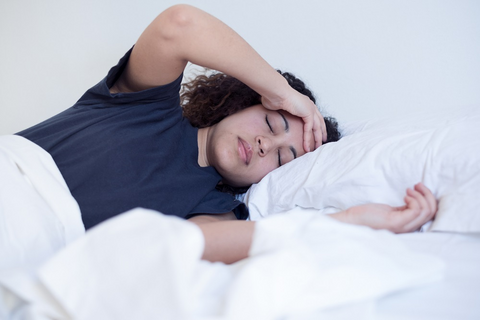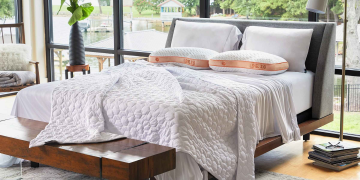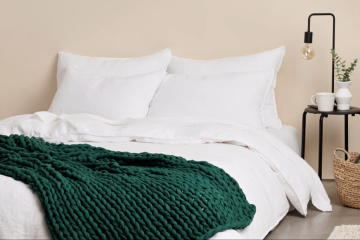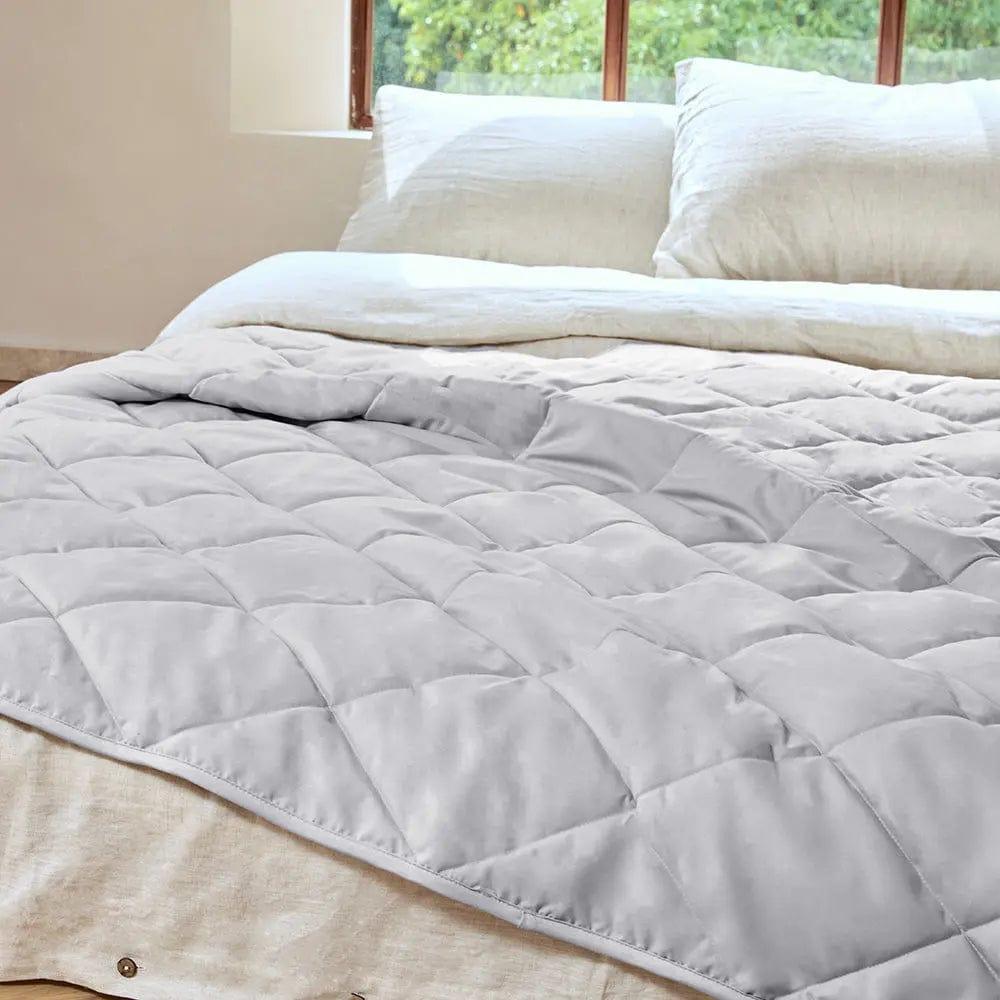Night sweats are a common complaint. It’s reported that over 41% of people recently experiencing sleep night sweats . And women tend to experience them more than men. Part of the reason for this difference is that night sweats tend to accompany perimenopause and menopause.
Although it’s good to know you’re not suffering alone, regular sleep interruption caused by night sweat plays havoc with health and wellbeing at a time when you’re already busy juggling the demands of family and career. Fortunately, there are things you can do to minimize the impact of night sweats on your daily life and reduce the sense of trial and error you might experience when dealing with this menopausal symptom. In this blog, we cover some of the reasons you may be sweating at night, best anti-sweat bedding you can choose and tips to reduce sweating.

What are night sweats ?
It is important to note that flushing (a warmth and redness of the face or body) may be hard to distinguish from true night sweats. Doctors often hear their patients complain of night sweats. Night sweats refer to excess sweating during the night. But if your bedroom is unusually hot or you are wearing too many bedclothes, you may sweat during sleep, and this is normal.
Night sweats are not caused by the bedroom environment. Instead, the cause is internal. True night sweats are severe hot flashes occurring at night that can drench your clothes and sheets. Night sweats do not necessarily indicate that there is something medically wrong, but their association with some serious conditions means that it is important to speak to your doctor if you are concerned.
What causes night sweats in women?
Night sweats can affect anyone, but they’re most commonly associated with people assigned female at birth. Up to 80% of women experience hot flashes and night sweats related to menopause, and as many as 60% experience them during pregnancy. Understanding what causes night sweats in women can help you learn how to manage this symptom and get your best night’s sleep. It can also help you decide when you should speak with a doctor about your night sweats.
Some of the known conditions that can cause night sweats are:
Menopause and perimenopause
This is a very common cause of night sweats in women. Menopause refers to the time when you stop menstruating. The term perimenopause refers to the years leading up to and the year after your last period. The average age of menopause is 52 years old. However, perimenopause symptoms often begin years earlier.
During perimenopause, ovarian function begins to fluctuate, leading to changes in hormones like estrogen and progesterone. These shifting levels of hormones can cause a number of uncomfortable symptoms including hot flashes and night sweats.
Premenstrual syndrome (PMS) or premenstrual dysphoric disorder (PMDD)
Hormone fluctuations during your menstrual cycle can also cause night sweats. Your estrogen levels decrease before your period, in the time most commonly associated with PMS and PMDD. While symptoms like irritability and cramps are more commonly associated with PMS and PMDD, night sweats can occur, too.
Pregnancy
Pregnancy causes pronounced hormonal changes. This is why hot flashes and night sweats are so common during pregnancy and after giving birth. Changes in estrogen levels associated with producing breast milk may also lead to night sweats.
Infections
Infections release inflammatory mediators that raise your thermoneutral zone. This causes a familiar fever cycle, beginning with shivering to raise your internal temperature. Once your thermoneutral zone returns to normal, you will likely start sweating to decrease your temperature. This cycle usually occurs repeatedly during an infection and can cause night sweats if it happens at night. Your body’s viral or bacterial load may also rise during sleep, increasing the likelihood of night sweats.
Medications
Taking certain medications can lead to night sweats. Antidepressant medications are a common type of drug that can lead to night sweats. From 8% to 22% of people taking antidepressant drugs have night sweats. Other psychiatric drugs have also been associated with night sweats. Medicines taken to lower fever, such as aspirin and acetaminophen, can sometimes lead to sweating. Many other drugs can cause night sweats or flushing.
Hypoglycemia
Low blood sugar can cause sweating. People who are taking insulin or oral diabetes medications may have hypoglycemia at night that is accompanied by sweating.

What is the best bedding for night sweats?
It’s an unavoidable fact that menopause comes with night sweat for many women. The night sweat can not be totally fixed by changing your bedding, but the suitable bedding does help a lot in reducing the discomfort and disruption the symptom cause.
Best mattress for night sweats
When it comes to choosing the best mattress for avoiding night sweats, material is the most important. Foam mattresses can get especially warm while you’re sleeping which means they’re best avoided. Memory foam works by softening in response to your body’s heat and holds onto the heat to help it respond to changes in your body’s position. If your night sweats are especially bad, you may worry about cleaning your mattress frequently. Using a mattress with removable cover can helps a lot. But you should be careful with the fabric while choosing the mattress because some cover can trap heat and exacerbate night sweats. Using a mattress with specialist cooling cover such as Zonli cooling floor mattress can help reduce the chances of night sweats while also protecting your mattress.
Best blankets for night sweats
The best blankets for coping with night sweats are those made with natural fibres. Bamboo is one of the best options thanks to the way it helps with temperature regulation as you sleep. The wonder of a bamboo cooling blanket is that not only will it help to regulate the body temperature, but it can also allow moisture to evaporate through the fabric, helping you stay cooler while you sleep and wake-up feeling fresher. – it’s a win-win! Other natural fibre blankets such as linen, cotton and silk fills are good options too.
Best pillows for night sweats
There are a few options when it comes to finding the best pillow for night sweats. Pillows made with natural fills such as wool or silk will help draw moisture away from your head and face as you sleep and keep you cooler.
However, natural fill pillows aren’t right for everyone and this is where cooling pillows are a great choice. Made with synthetic fills but covered with a technical cooling fabric – similar to the fabrics seen in high-performance sportswear. The fabric draws heat away from your head and face for a cooler night’s sleep.

Tips to Reduce Night Sweats
In many cases, the best way to reduce or eliminate night sweats is to treat the underlying cause, such as hormone fluctuations or infections. However, not all night sweats are caused by an underlying condition, and the results of treatments are not always immediate. In addition to any medical treatments suggested by your doctor, you can also take other preventative steps to improve your sleep quality:
-
Have a cool drink: A few sips of cold water or another cool drink right before you go to bed may help keep you cool down and feel more comfortable as you fall asleep.
-
Keep the air moving: Make sure you have good air circulation in the bedroom. Open a window and consider using a fan to keep the air moving
-
Wear the right PJs:Choosing nightwear that’s made with light, breathable fabrics will help you keep your cool more easily. Woven cotton or linen nightwear is ideal. Silk is especially good at helping you stay cool at night. Avoid nightwear made with synthetic fabrics – check the label if you’re unsure.
-
Stress-Relieving Techniques: Night sweats can be stressful, as are many of the conditions that cause them. Stress also worsens night sweats, making relaxation techniques a useful approach. Some popular methods to reduce stress include mindfulness, guided imagery, meditation, and breathing exercises. Hypnosis and cognitive behavioral therapy can also help.
-
Maintaining a Healthy Weight: Exercise daily by walking, swimming, dancing, bicycling, etc.Excess weight can be both a cause of night sweats and a risk factor for conditions that cause night sweats, such as sleep apnea.
-
Avoiding Caffeine, Alcohol, and Spicy Food:These foods can affect your internal temperature and cause you to sweat. If you experience night sweats, avoiding eating or drinking these close to your bedtime may help relieve your symptoms or avoid triggering them further.

